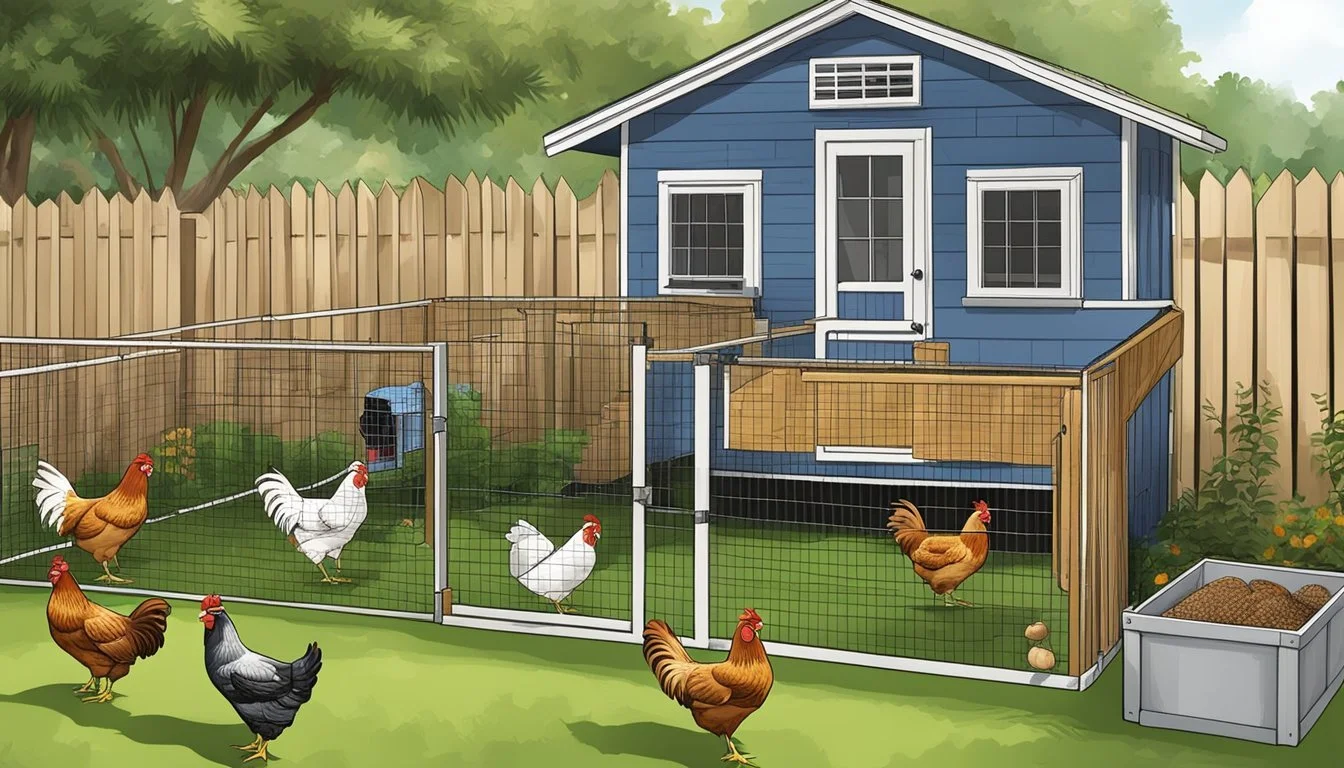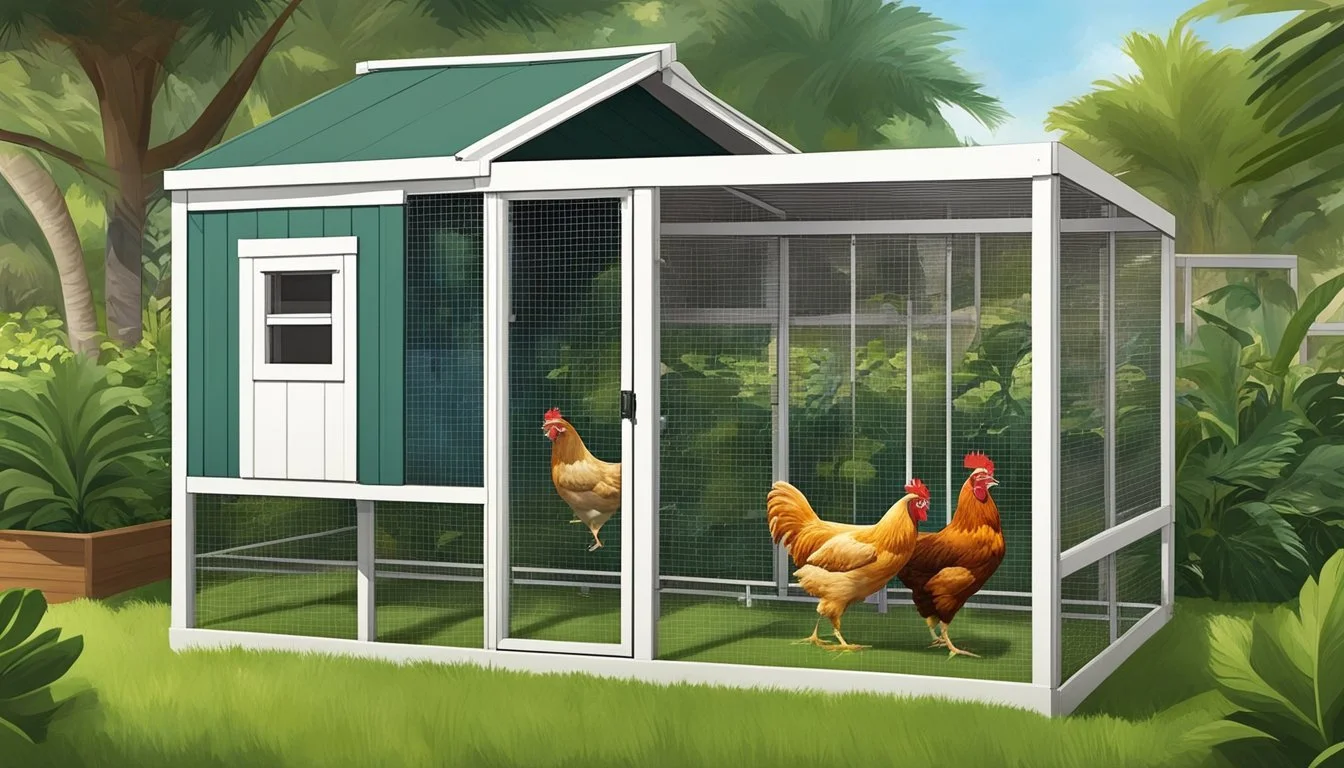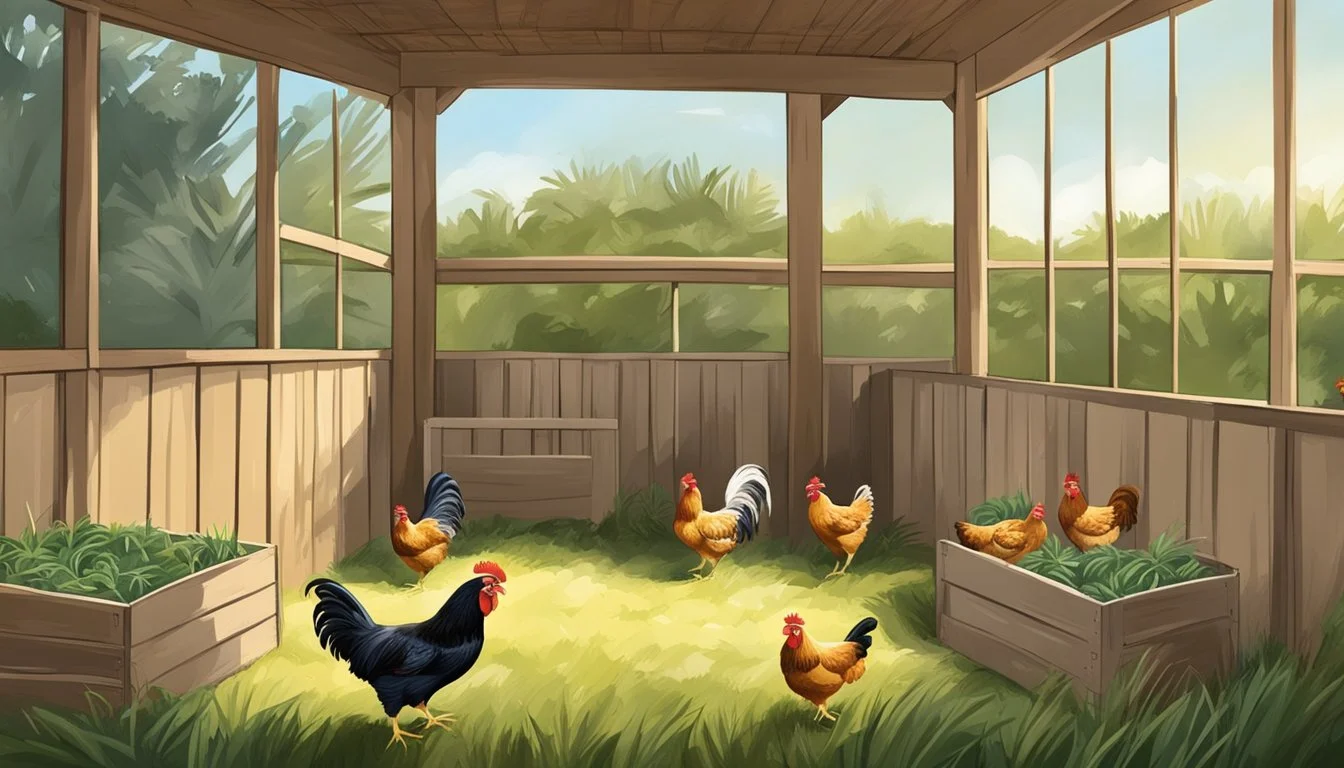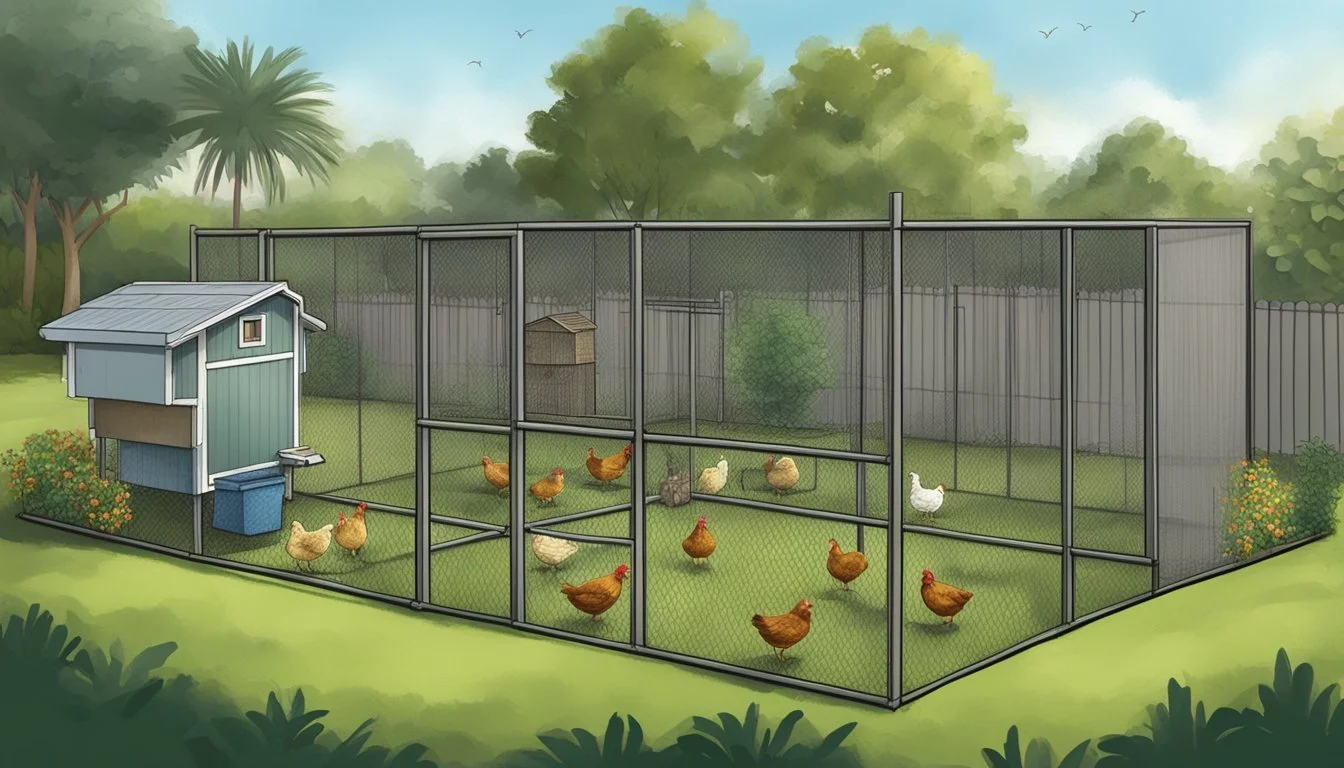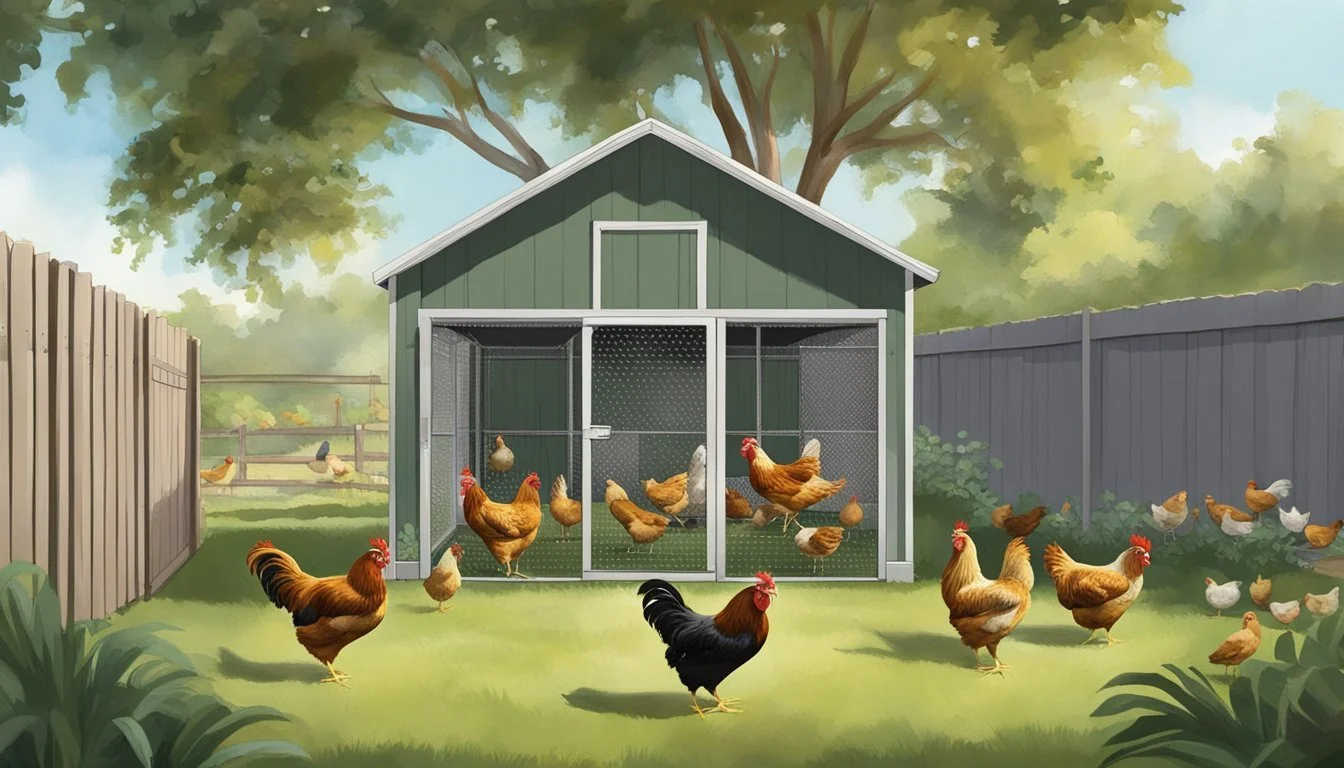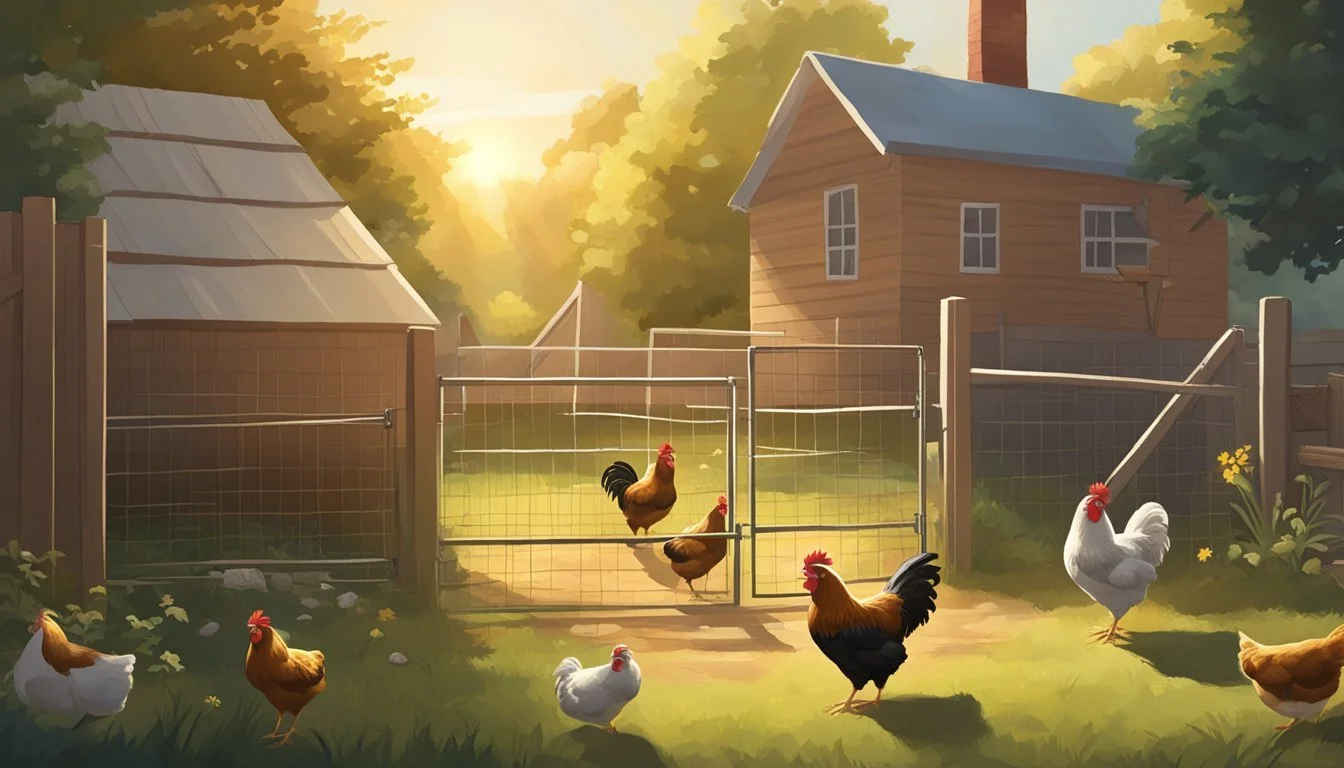Keeping Backyard Chickens in Palm Bay, FL
Essential Tips for a Thriving Flock
Backyard chickens (how long does chicken last?) have become a popular venture for residents looking to embrace a more sustainable lifestyle in Palm Bay, FL. The city ordinance allows for the keeping of up to four hens on single-family residential lots within specified zoning districts. These provisions cater to a growing interest in local food production and offer a way for homeowners to enjoy fresh eggs right from their backyards.
Prospective poultry keepers in Palm Bay must adhere to certain guidelines to ensure the welfare of the chickens and to maintain harmony within the community. It's mandated that chickens must be caged at all times, and the enclosures should meet the city’s requirements for animal housing. Moreover, there's a clear stipulation that the breeding of chickens is prohibited, as is the keeping of roosters due to their potential noise disturbance.
The city's approach mirrors a broader trend across the state of Florida, where many municipalities have crafted ordinances acknowledging the benefits and challenges associated with backyard chickens. While the specifics may vary by location, these regulations generally reflect a balance between enabling residents to keep chickens and maintaining public health and neighborhood aesthetics.
Local Legislation and Permitting
Palm Bay, Florida residents interested in raising backyard chickens must navigate a series of local laws and ordinances. These regulations are designed to ensure public health and community standards are maintained.
Understanding Zoning Laws in Palm Bay
In Palm Bay, zoning laws determine where chickens may be raised. The areas that are zoned for backyard chickens include RE, RS-1, RS-2, RS-3, SF-1, SF-2, and SRE Zoning Districts. These districts primarily cover residential areas, indicating the city's focus on allowing chicken keeping in more suburban and rural parts of Palm Bay, rather than in denser urban cores. Potential owners must verify their property's zoning district with Brevard County records or consult with City Hall to ensure compliance.
Permit Requirements and Restrictions
Before starting a backyard flock, Palm Bay residents must understand the permit requirements and restrictions:
Permitting process: Residents must apply for and obtain a permit specific to backyard chicken keeping.
Hen-only policy: Only hens are allowed; roosters are prohibited to minimize noise disturbances.
Limit on chicken numbers: Up to four chickens are permitted on a single-family lot.
Housing requirements: Chickens must be housed in appropriate cages or coops at all times, which should adhere to specified criteria for animal cages and enclosures.
Non-compliance with these restrictions can result in fines, the revocation of permits, or other legal consequences.
Impact of City Ordinances on Backyard Chicken Keeping
City ordinances in Palm Bay have a direct impact on how residents can keep backyard chickens. These local government regulations are put in place to balance the interests of the community, animal welfare, and the rights of individual homeowners. For instance, the prohibition on breeding and the mandate for immediate, proper disposal of dead chickens reflect the city's dedication to both neighborhood sanitation and the humane treatment of animals. Residents should stay informed about City of Palm Bay ordinances as they may be updated, potentially affecting the legality and practice of chicken keeping in residential areas.
For the most current regulations and guidance on permits and restrictions, individuals should contact the City of Palm Bay or access the Code of Ordinances through the city's official website.
Choosing the Right Chicken Coop
When selecting a chicken coop in Palm Bay, FL, chicken keepers must focus on size, design, maintenance, and security to ensure the health and safety of their flock.
Coop Size and Design for Optimal Health
The size and design of a chicken coop must accommodate the specific number of chickens, providing ample space for each bird. A coop must be spacious enough to promote healthy behavior and easy movement. Palm Bay ordinances recommend that the coop be caged at all times to comply with local regulations. Additionally, it must offer adequate ventilation to keep the air fresh and prevent the buildup of ammonia from chicken waste.
Maintenance and Cleaning
A clean and properly maintained coop is essential for the health of backyard chickens. The coop should be designed for easy access to facilitate regular cleaning. Surfaces must be smooth and materials non-porous to avoid harboring bacteria. The inclusion of removable waste trays can simplify the removal and disposal of droppings, which should be done regularly to prevent diseases.
Security Against Predators
Chicken coops in Palm Bay must be predator-proof to protect chickens from common threats like raccoons, snakes, and birds of prey. Strong wire mesh should be used instead of chicken wire to reinforce cages and enclosures, as it is more durable against aggressive predators. The coop must also feature secure locks and solid construction to deter any unauthorized access.
Runs attached to the coop should equally be secure with buried wire mesh to prevent predators from digging underneath.
Chicken Breeds and Their Requirements
Selecting the right chicken breeds for Palm Bay's climate is essential for the welfare of the backyard flock. Each breed has its own requirements, and understanding these is crucial for maintaining healthy birds.
Best Breeds for Palm Bay's Climate
The hot and humid climate of Palm Bay, Florida, favors hardy breeds that can withstand temperature extremes. The following breeds are well-suited for the conditions in Palm Bay:
Rhode Island Red: These birds are robust and adaptable, thriving in various climates. They are excellent layers, producing about 250-300 eggs annually, and are known for their brown feathers.
Silkie: Known for their distinctive fluffy plumage, Silkies tolerate heat well if shaded and provided with ventilation. They are calmer and make excellent pets.
When providing for these breeds, ensuring adequate shading, ventilation, and water is vital to manage the heat and humidity of Palm Bay.
Understanding Breed-Specific Needs
Chickens are not a one-size-fits-all livestock. Each breed has specific needs:
Space: Birds like Rhode Island Reds require more space due to their size, whereas smaller breeds like Silkies can manage with slightly less.
Diet: A high-quality feed appropriate for the breed's age and production status (laying, meat, or chick growth) is necessary.
Temperature Regulation: While some breeds have adaptations for hot climates, all chickens will require shade, fresh water, and ventilation, such as a fan, during extreme heat.
Ensuring that these needs are met is essential for the health and productivity of the chickens. It is important to remember that only hens are allowed in Palm Bay, as roosters are prohibited. Breeding of chickens is also not allowed.
Feeding and Nutrition
Proper nutrition is crucial for the health and productivity of backyard chickens. This section provides detailed guidance on feeding practices and the dietary needs of chickens.
Feeding Your Chickens Properly
Ensuring that chickens have access to the right type of food is essential for their growth and egg production. A chicken’s diet should primarily consist of a balanced commercial poultry feed that meets all their nutritional requirements. It's important to provide feed that is appropriate for the chicken's stage of life – chick starter for young chickens, grower feed for adolescent chickens, and layer feed for egg-laying hens.
While commercial feeds include grains, protein, vitamins, and minerals, owners may also offer a small amount of scratch grains as a treat. Treats should never exceed 10% of a chicken's overall diet to prevent nutritional imbalances. Always provide clean, fresh water at all times, as it aids in digestion and overall health.
Understanding Nutritional Needs
Chickens require a combination of proteins, carbohydrates, fats, vitamins, and minerals to thrive. Their feed mixture should be:
High in protein: Essential for growth, feathers, and egg production.
Balanced with energy: Usually from carbohydrates, which offer the energy chickens need for daily activities.
Ample in calcium: Particularly for laying hens, as it is necessary for strong eggshells.
Moderate in fats: Needed for energy, but too much can lead to obesity and health issues.
Owners should monitor their chickens' health regularly to ensure their nutritional needs are being met, watching for signs of deficiency or excess, such as poor feathering or a drop in egg production. Vitamins A, D, E, and B12, among others, play specific roles in the health of chickens, requiring a varied and balanced diet.
Health and Welfare
Maintaining the health and welfare of backyard chickens in Palm Bay, FL, requires vigilant management to prevent disease and ensure a clean environment. Proper veterinary care is also essential to detect and treat any health issues promptly.
Preventing Diseases and Parasites
Prevention is the first line of defense against diseases and parasites in backyard chickens. Owners must maintain a clean coop to hinder the spread of diseases and the attraction of vermin and insects, which are vectors for disease. Here are specific steps for prevention:
Regular Cleaning: Coops should be cleaned weekly, with all bedding replaced and surfaces disinfected.
Control Vermin and Insects: Use vermin-proof containers for feed storage and maintain the coop to prevent entry points for pests.
Quarantine New Birds: Newly introduced chickens should be quarantined for at least 30 days to prevent the introduction of diseases into the flock.
Regular Health Checkups and Veterinary Care
Chickens require periodic health checkups and access to veterinary care when needed. Owners should engage in the following practices:
Observation: Daily observation helps in early detection of abnormalities in behavior or appearance that may indicate health issues.
Professional Care: Establish a relationship with a veterinarian who can provide regular checkups and treat any health conditions that arise. It’s important to consult the vet if a chicken appears ill or if there's an unexpected death in the flock.
Dead Chickens: Carcasses of dead chickens must be removed immediately from the premises and disposed of properly, following the city’s regulations, to prevent the spread of disease.
Regular adherence to these practices helps to preserve the health and welfare of backyard chickens, ensuring a happier, productive flock.
Managing Egg Production
Egg production in backyard chickens necessitates attention to the birds' environment and care for the eggs they lay. Proper management can enhance the productivity of hens and ensure the freshness of eggs.
Optimizing Conditions for Laying Eggs
Creating an optimal environment for hens to lay eggs involves considering breed-specific needs and general best practices.
Nesting Boxes: Hens require a comfortable and secluded space for laying eggs. Nesting boxes should be spacious, with one box for every three to four hens and filled with clean, dry bedding.
Light Exposure: Chickens need about 14 to 16 hours of light per day to maintain a consistent laying cycle. Use artificial lighting to supplement natural daylight, particularly in the shorter days of winter.
Diet: A balanced diet rich in calcium and protein promotes healthy egg production. Provide a layer feed and ensure access to clean water at all times.
Collection and Storing Fresh Eggs
Regular collection and proper storage are key to maintaining the freshness of eggs.
Collection Frequency:
Eggs should be collected at least once a day, but preferably multiple times, to reduce the likelihood of breakage or spoilage.
Storage Methods:
After collection, eggs can be stored at room temperature for several days if they are un-washed. If washed, they should be refrigerated.
Keep eggs in a carton pointed end down to maintain their freshness longer.
By closely monitoring and adjusting the conditions in which hens live and lay, and carefully handling the eggs they produce, backyard poultry enthusiasts can enjoy a steady supply of fresh eggs in Palm Bay, FL.
Understanding Local Restrictions
In Palm Bay, FL, individuals considering raising backyard chickens must adhere to specific local ordinances that define how many chickens can be kept and the type of chickens allowed. These rules are set to ensure neighborhood harmony and public health.
Limitations on the Number of Chickens
Residents of Palm Bay are permitted to keep up to four (4) hens on single-family lots in designated zoning districts. These districts include RE, RS-1, RS-2, RS-3, SF-1, SF-2, and SRE. Keeping within these limits is essential for compliance with local regulations.
Rules for Rearing Roosters
The city explicitly prohibits roosters; therefore, only hens may be reared. This rule helps to minimize noise disturbances within neighborhoods, a common concern with roosters due to their crowing. Residents must ensure that they only raise hens to abide by the Palm Bay ordinances.
Community Impact and Etiquette
Keeping backyard chickens in Palm Bay, FL affects the wider community through noise and waste management. Respectful practices ensure harmonious coexistence between chicken keepers and their neighbors.
Respecting Neighbors and Noise Control
Residents must remember that hens only are permitted in Palm Bay, as roosters are prohibited due to their loud crowing, which can disturb the peace, especially in the mornings. Noise control is vital for maintaining good relationships with neighbors. Chickens should be kept in a coop to minimize noise.
Handling Waste and Composting
Waste management is another critical aspect of urban chicken keeping, as it pertains to both cleanliness and community health. Proper disposal involves composting chicken waste or securing it in a closed bin to avoid attracting pests. Composting should be done correctly to ensure it does not emit persistent odors that could affect the community.
Integrating Chickens into Family Life
Integrating chickens into family life in Palm Bay, FL affords numerous benefits, including the joys of companionship and educational opportunities for children. They can become treasured family pets and provide a unique learning experience.
Chickens as Family Pets and Companions
Chickens can offer the same level of companionship as traditional family pets such as dogs or cats. Residents of Palm Bay may keep up to four hens on single-family lots within specific zoning districts, ensuring a manageable flock size for personal attention and care. These birds often display distinct personalities, and when handled frequently and gently, they can become quite affectionate and enjoy human interaction.
Educational Benefits for Children
Children can derive significant educational benefits from raising backyard chickens. They learn responsibility through daily feeding, cleaning, and health checks. Additionally, children are exposed to the life cycle firsthand, witnessing the development from egg to adult chicken. This interaction promotes a sense of stewardship and empathy, along with practical skills in animal care and sustainable living practices.
Conclusion
Residents of Palm Bay, FL, maintain the opportunity to cultivate a backyard flock, specifically with the allowance of up to four hens per single-family lot in designated zoning districts. Such practice aligns with Florida's generally receptive stance on backyard poultry, confirming the state's position as accommodating for enthusiasts of domestic aviculture.
Key considerations for potential and existing owners include:
Zoning Compliance: Ensure the property falls within RE, RS-1, RS-2, RS-3, SF-1, SF-2, or SRE Zoning Districts.
Hens Only: Roosters are notably prohibited to mitigate noise concerns.
Permitting Process: While not highlighted in detail, owners should verify if a permit is necessary and adhere to any specific requirements.
The benefits of owning backyard chickens can comprise:
Fresh egg production
Natural pest control
Educational experience
However, individuals must couple the decision with responsibility. This encompasses:
Providing adequate shelter
Ensuring regular feed and clean water
Maintaining cleanliness to deter pests
While backyard hens are permissible in Palm Bay, it is incumbent upon prospective buyers to review local ordinances thoroughly to remain compliant, and when in doubt, consult with municipal authorities. Prospective and current owners can optimize their experience by embracing responsible care and staying informed of best practices.


